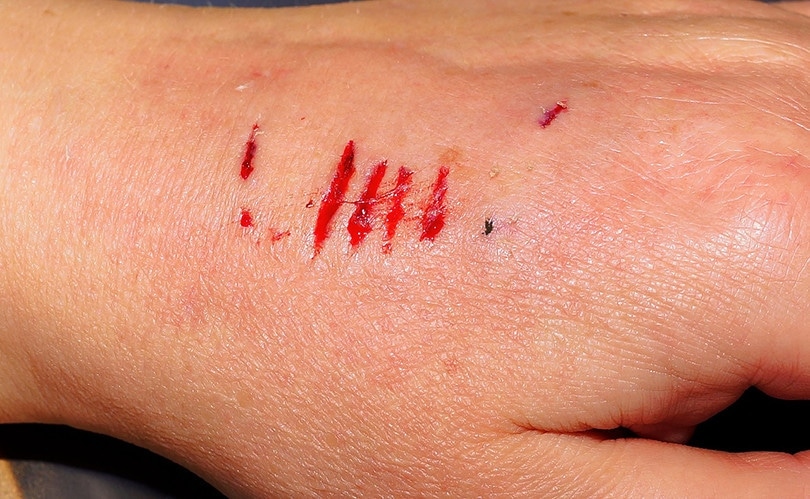
We’d all like to think that it can’t happen to us. However, all dogs can bite. Even dogs that are very well socialized and those that would “never hurt a fly” have the potential to seriously bite someone. Therefore, while socializing and training are important, it’s also essential that you understand the reasons behind dog bites—and what you can do to make some of those reasons not a problem.
Dogs tend to bite and act out when they are stressed or in pain. People often think that dog bites are just the canine “being mean.” However, the truth is that most bites happen for a reason, even when the dog may not necessarily intend to hurt anyone.
Below, we’ll go over some of the most common reasons dogs bite. Then, we’ll dive into how you can stop biting before it happens.
The 5 Reasons Why Dogs Bite?
1. Fear
Dogs most commonly bite due to fear. Just like all animals, dogs have a natural instinct to protect themselves. When something scary or threatening is happening, a dog may bite in an attempt to do just that.
Of course, sometimes dogs bite when there really isn’t anything for them to be scared of, but they don’t know that. Dogs can be scared of things that aren’t necessarily logical to us humans but feel threatening to an insecure dog that is not properly desensitized.

There are many situations that may trigger fear bites, including:
It’s important to understand your dog’s body language so that you can pick up on fear before the dog bites. These behaviors often include growling, barking, and cowering. A dog may obviously try to get away from the scary thing and may turn to biting if they aren’t able to escape.
You should do your best to defuse the situation before the dog bites. The worst thing you can do is back a scared dog into a corner—these dogs should typically be allowed to flee and remove themselves from the situation.
2. Pain
Even the most well-socialized dog may bite when they are in pain. Often, pain inhibits a dog’s ability to think straight and may cause them to act in ways they wouldn’t otherwise. They may even bite a well-trusted owner, for instance.
Pain can be caused by a range of things, including injuries, illness, and recent surgery. Often, dogs in pain need our support or care. Therefore, not interacting with an in-pain dog isn’t usually possible. However, you should take steps to avoid getting bit in this situation, such as using a muzzle.
3. Resource Guarding
Dogs will naturally guard their resources, especially if they aren’t well-socialized. Dogs that come from a background where resource competition was a real thing (like strays) may be even more prone to resource guarding. Food is the most common resource that dogs guard. However, toys, beds, and even people also fall into this category.
If a dog feels that their resources are threatened, they may bite or lash out to protect their access.
Resource guarding requires careful management and training. You should never push a dog that is guarding a resource, as this may only make the guarding worse and increase the odds of a bite. Instead, careful training is often necessary.

4. Play
Many dogs bite during play, especially if not properly trained or socialized. All puppies will naturally bite as a normal part of play. However, they should be trained not to do this as soon as possible. While puppy bites often aren’t a problem, they may become a problem when the dog becomes an adult.
Play biting can quickly escalate into a serious injury. There have been many cases where dogs played a bit too hard and sent someone to the hospital, especially when there was a pack of dogs together.
While play biting may not seem as serious as these other reasons, it’s vital that it receives the same amount of training and care that other bites do.
5. Aggression
Some dogs are simply more prone to biting than others. These dogs may bite for no apparent reason, though there is usually a reason underneath the surface. Often, aggression comes from fear, which we already discussed. However, some dogs may be fearful of everything, especially if they are not properly desensitized.
Furthermore, some owners mistakenly teach their dogs not to growl. While this does make the dog not growl inappropriately, in some cases, it encourages them to skip growling and go straight to biting. When these dogs aren’t allowed to communicate, it can often look like they’re biting for no reason.
Some health conditions can also cause dogs to become more aggressive. For instance, blind or deaf dogs may get jump scared more commonly than other dogs, which can lead to biting.
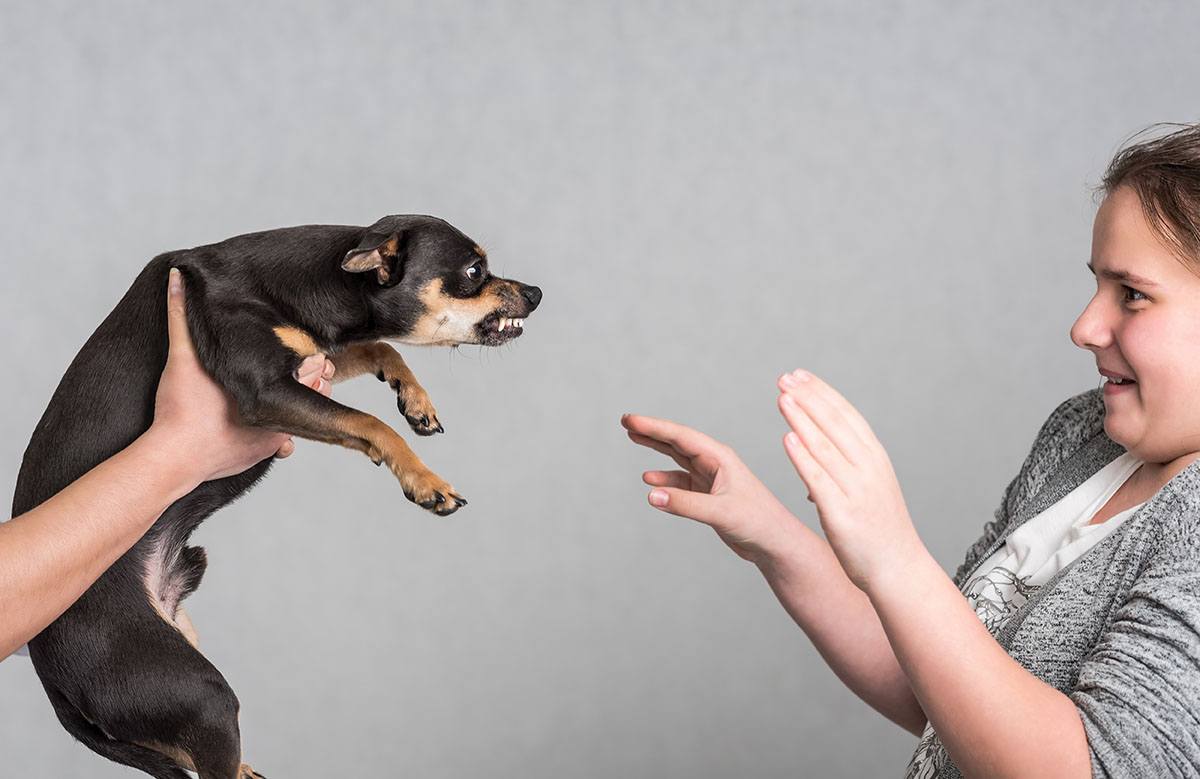
Other Factors That Cause Dog Bites
Often, a dog bite doesn’t happen just because of one underlying reason. It is often because of many differing factors. Here are a few that may contribute to biting:
What Can Be Done to Prevent Dog Bites?
Do Proper Socialization and Training
Every dog needs to be socialized and trained properly. Socialization involves exposing the dog to as many people, places, and experiences as possible. This way, the dog learns what is normal and okay. It prevents the dog from being as fearful later, as there won’t be as many new, scary things.
Dogs should also be trained and know basic commands. These can help control a dog in a new, scary situation, preventing bites. All dogs should be taught to obey their owners, even in stressful situations.
Both training and socialization help prevent dog bites. They can be a lot of work, but they are a part of responsible dog ownership. How a dog is raised plays a huge role in its temperament.
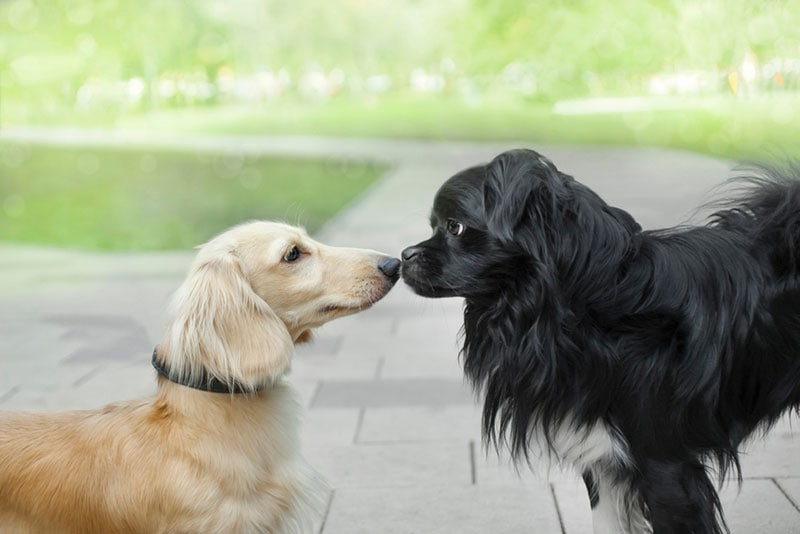
Avoid Stressful Situations
If your dog is scared or stressed by something, avoid it. For instance, some dogs may be very stressed by small spaces, while others may not care. If your dog becomes anxious with confinement, avoid confining them if possible. Be sure to supervise your dog carefully and remove them whenever they become overly stressed by a situation. Then, work with a trainer to gradually desensitize your dog to the triggering situations and build up their trust and confidence through positive reinforcement methods.
Sometimes, medication can help prevent your dog from becoming overly anxious during must-do activities. For instance, if your dog tends to lash out at the vet, it may be necessary to medicate them before the visit.
Dog bites most commonly happen at home or places where your dog spends their time every day. People often mistakenly believe that their dogs are completely safe at home when this isn’t the case. To prevent dog bites, it’s important to consider that every dog has the possibility to bite. Therefore, dogs acting fearful at home should be taken seriously, even if it’s a situation that doesn’t seem all that scary to you.
Monitor Your Dog’s Behavior
You should be well-acquainted with dog body language to understand when your dog is stressed and fearful. Any sign that your dog is uncomfortable should be taken seriously. Most dogs will show signs that they’re about to bite before they do.
Never punish your dog for growling. This doesn’t prevent them from being aggressive but encourages them just to skip straight to biting.
Many people know that growling, baring teeth, and snarling are precursors to aggression. Some dogs may also lick their lips, put their ears back, stiffen their body, or tuck their tail. Full-body shakes are also a sign that a dog is stressed.
When your dog is showing an aggression precursor, this is your chance to redirect them and prevent the bite, whether that means removing them from the stressful scenario, taking a step back, or doing whatever else is needed in the specific situation. If you are unsure, consult a professional trainer, as they will help you develop a successful management plan.
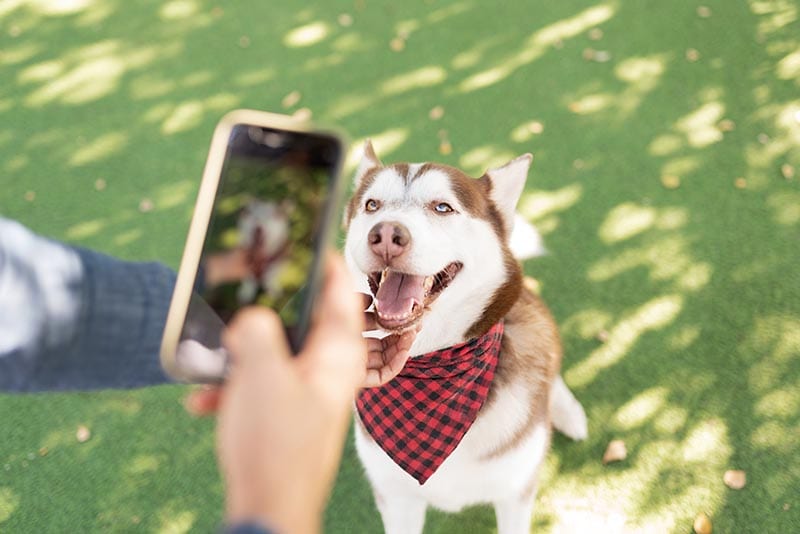
Get Help From a Professional
Sometimes, despite our best efforts, dogs may simply be aggressive. Sometimes, dogs may be particularly scared of something, whether due to a traumatic event or innate fear. In these cases, seeking help from a dog trainer or professional is recommended.
Rescued dogs may need this help more than others. Often, they may not have gotten the proper socialization when young. Therefore, when adopted as an adult, they may need extra help to become comfortable, adapted members of our world.
Provide Proper Care
Dogs may be more likely to bite when they aren’t properly cared for. If a dog is hungry, they may be more prone to stress and anxiety, resulting in bites. Not getting enough exercise or daily socialization may also fall into this category.
Just like a child that’s not allowed to play actively may become fidgety and defiant, a dog may do the same thing. Dogs can become high-strung when they have too much bottled-up energy. When faced with a triggering situation, these dogs can become more reactive, leading to biting.
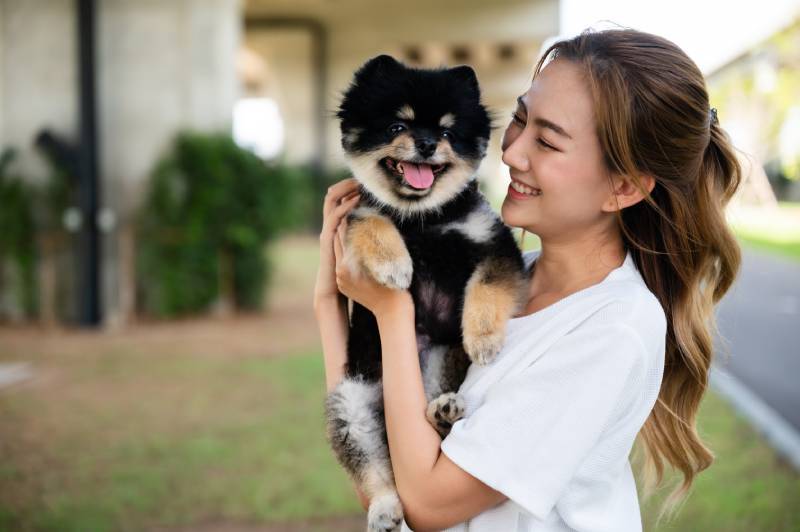
Monitor Our Behaviors
Our behavior can also cause bites. It’s important to interact and care for dogs properly, or even the most well-behaved dog can lash out. This includes:
Preventing Dog Bites With Children
Often, we are particularly worried about protecting children from dog bites. It’s important that children are taught how to respect animals and interact with them. Children shouldn’t be allowed to climb on dogs, for instance.
However, it’s a parent’s responsibility to ensure children behave properly, even if we think they already know how. Even the best-meaning child can accidentally touch a dog incorrectly or frustrate a canine. Misunderstandings can cause bites. Teach children to avoid dogs they do not know. They should never approach a dog to pet them. Some dogs may be improperly socialized with children or could be reactive. This includes situations where a dog is being walked by the owner, as well as dogs wandering around.
If a child wants to pet a dog, instruct them to ask permission first. Again, some dogs may not take well to strangers touching them. Ask every time, even if you have petted the dog before. Always tell children to avoid escalating situations with dogs by running, hitting, or making sudden movements. Slow movements are best when the child is able.
Teach children not to tease dogs by taking their toys, treats, or food. They shouldn’t pretend to hit or kick the animal. Don’t let children pull on a dog, climb on them, or try to ride them. Don’t let children play “dress up” with a dog, even puppies or smaller dogs.
Dogs should have a place where they can escape and be left alone. A crate that’s properly set up can serve this function. Children should be taught not to disturb dogs when they are in this space, and they should be taught to leave a dog alone when they are eating or sleeping.

What to Do If Bitten
Sometimes, despite our best efforts, dogs may bite. When this occurs, you should perform the following steps right away:
If your dog bites someone, you’re responsible for helping the injured party and removing the dog from the situation.
Final Thoughts
Dog bites can be extremely serious. While deaths are rare, they can absolutely occur. Unlike many misconceptions, dog bites tend to happen at home and from known dogs. Dogs rarely run up to random people and bite them. Instead, they usually occur during a stressful situation that causes the dog to behave abnormally.
Therefore, you should never consider a dog to be 100% safe. Dogs can act very differently when in pain or scared. Therefore, you should always assume that your dog can bite during these situations and take the necessary steps to prevent bites.
Featured Image Credit: Kapa65, Pixabay
The post Why Do Dogs Bite? 5 Vet Approved Reasons & What You Can Do appeared first on Pet Keen.



